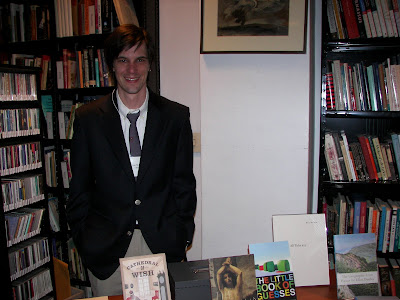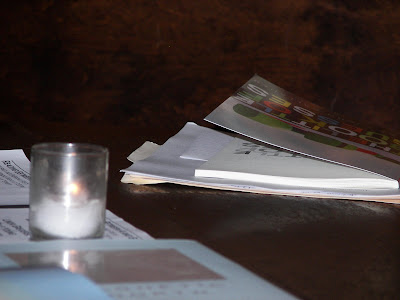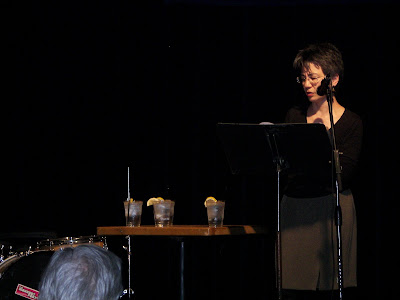
Wings of Desire
Perhaps that’s all there is,
wings of desire: the girl
on the swing, and what the dead are up to
this year.
And when we do these things,
it’s a gesture. It’s the trees
and sometimes sun.
“Art is beautiful but it is hard, like a religion without a purpose.”
— GUNTER BRUS
Well, that presupposes that religions actually have a purpose beyond the purposeless purpose of art, of which, personally, I’ve yet to be fully convinced.
But, taken on (ahem) faith, there’s still this other question, “hard” in what way specifically? The need to constantly create? The need to constantly push against some boundary of some sort? the constraints of echoes that surround all new art? The need to encounter the presence, the IS, but to allow desire, the reality, to rise? Perhaps all these, and more?
It's kind of a brainstorm, perhaps, but instead of trying to compose a poem, I’m wondering if it might be profitable to think about it as composing a stance, some hypothetical (possibly real and believed as well) way the world beings itself forth. In this contemplating of the stance, it’s not the object, not the thing itself, that’s the question, but the positioning of the artist in relation to all things in the presence of the object, the thing itself, that forms the poem, so that the poet is already half ready to compose the poem, as the stance and the world are already in play, just waiting for the object to arrive. Perhaps, in this conceptualizing of it, sentences and poems will come more readily, unbidden even. It's the project of being rather than of a trying to write poems.
Is there any clarity to this? I don’t know. I’ve always thought of the THING as paramount, and that the poem begins in attention, in attending, the thing. I still do think this, but perhaps, rather than thinking of the attention toward the thing, perhaps what I should be thinking more about is the preparation of the artist to receive the thing. Ok, so I was raised Catholic, what can I say.
“I don't develop; I am.”
—Pablo Picasso
“I produce music as an apple tree produces apples.”
— CAMILLE SAINT-SAENS
According to Picasso and Saint-Stevens, it seems the artist should not try, but be, so that the artist embodies the art. It’s always conceptual, in this way. It’s always periods, seasons, and it’s rarely what we say it is when we speak about it. It’s really about creating a metaphor for our primary relation to it. Where “it” is always indeterminate.
To the tree, the apples are not a question, they simply are. It seems a beautiful almost one-ness, so there is no question of attending, as the attending is a natural outcome of one being fully who one is, in and with, the world.
“The artist need not know very much; best of all let him work instinctively and paint as naturally as he breathes or walks.”
— EMIL NOLDE
So then it’s a call away from intention and even attention, and toward the body and the livingness of the artist. The being in the world, and the totality of the possible. But how can the artist be ready for totality when the artist is always going to be only capable of what the artist is capable of?
“The nature of the work is to prepare for a good accident.”
— SIDNEY LUMET
Because we’re really just looking to position ourselves for a happy accident. Because if what the artist produces is from the planning mind of the artist it will not rise above what the artist knows. The little the artist knows will become all there is, then, and the work will be unable to be more than the artist. Are these contradictory impulses, the “apple tree” above and the “good accident” here?
“Creativity is allowing oneself to make mistakes. Art is knowing which ones to keep.”
—Howard Aiken
“The triumph of anything is a matter of organization.”
— KURT VONNEGUT
“Sanity is perhaps the ability to punctuate.”
— PARRY IDRIS
That seems a healthy mixture of the two impulses. One doesn’t reductively plan, one produces art like an apple tree produces apples, while hoping for the good accident, the mistake that is more than what the artist brings to the composition, and then the artist must be positioned to understand what has just happened, the artist must organize the accident back into the artist’s conception. And the form, the punctuation, brings the thinking mind, the sanity, back to the accidents, which allows for this next thing to make sense, both for the artist and the person receiving the art:
“Art enables us to find ourselves and lose ourselves at the same time.”
— THOMAS MERTON
But practically, though, what is to be taught in such an economy of apples and accidents? How does one cultivate a stance, and what is a stance anyway? This idea that keeps creeping up around art, this finding and losing at the same time (or better, losing and finding at the same time, but perhaps that's splittinf hairs) sounds nice, but what do we actually take back to the composition from it? Is this just another way of saying that we should strive for the accident (getting lost) and the unification of composition (being found)?
I suppose, together, we're called to a place, a stance, or the getting to a place or stance, where whatever one does is art, through a certain attention to collage, through chance operations, through the happy accidents of context and random selection perhaps, if not to become the art, to at least texture or influence the art.
“Which country is real, mine or the teacher's? My wish is that we might progressively lose our confidence in what we think we believe and the things we consider stable and secure, in order to remind ourselves of the infinite number of things still waiting to be discovered.”
— ANTONI TAPIES
“Only when he no longer knows what he is doing does the painter do good things.”
— EDGAR DEGAS
So we often say things like, “Art cannot be taught but it must be learned,” etc. When what we really mean is, “I’m really not sure how it all works but I sure do like sitting around talking about art all day and getting paid for it.” Maybe it’s as simple as saying that we can teach the forms of art all day, but if you’re not getting the stance, the learned / unlearned stance, the Apollonian / Dionysian stance, or the wallowing in uncertainties stance, whatever, the forms will have nothing to hold onto. It’s this half-goofy, half-religious, stance that allows for the productivity of learning to unlearn.
“Sell your cleverness and buy bewilderment.”
— JALAL UD-DIN RUMI
“I'm afraid that if my devils leave me, my angels will take flight as well.”
—Rainer Maria Rilke
And then we have the life surrounding the stance, the artist perusing obsessions. The artist, in preparing a stance of open possibility, who is aware that any “no,” healthy as it may be to the life, is anathema to the art. How valid is this? How open should our open possibilities remain? At the very least, this seems true to me:
“Talent's like a baby. Wrap it up in wool and it goes to sleep.”
—Oscar Levant
And there’s a wrapped in wool aspect to a lot of our lives. How hard should we be on talent? How many demons and angels should we wish upon ourselves and each other? Perhaps no more than each of us already has, but, rather than ignore them, as we’re taught to do, we could word them. If that might be the case, what do we have, or what can we have, to bring to the art?
“Music is your own experience, your thoughts, your wisdom. If you don’t live it, it won’t come out your horn.”
— CHARLIE PARKER
So one is to be in constant awareness of one’s life, one must attend one’s life, but what does this mean, really? Certainly not simply the facts of one’s life. Facts are as cheap as the visible. Facts are not reality, they are just the trace reality leaves in passing. So what is it one must attend? This seems to be an integral unifying force to the stance. It is the experience of living a life that brings the apples and accidents under one umbrella. That makes them coherent.
There is, therefore, no such thing as inspiration in this way of conceiving of things. There is no pool you draw from, as pools imply depletion and recuperation, and in this conception, the only lessening would be when one stops the unifying of apples and accidents, when one feels one has answered something, when one feels these are no longer open questions. The fear is becoming one who stays at home in mind and spirit:
“There are so many dreams beyond your night, and so much sunshine beyond your grey walls. But you can't see it because you stay at home. There is so much sky above your roof. Is your door so old that it won't open, or are you staying at home because you're afraid of catching a chill.”
— FRANCOISE HARDY
On the other side of this equation then, is the conception of the fearless artist:
“Life shrinks or expands in proportion to one’s courage.”
— ANAIS NIN
Is the fearless artist a cliché? And since we’re dealing with Anais Nin, is courage equated with sex? That sounds nice, doesn’t it? But the courage seems to be less about the sex itself, the tying someone down with neckties, than it does the writing about it. The courage is less about action in life than it is action on paper. Hopefully we’re all courageous in life already. It makes for a more interesting world that way, as it bangs along. And if one can imagine it, why not imagine it? But artists go further than this:
“Forget safety. Live where you fear to live. Destroy your reputation. Be notorious.”
— RUMI
Ah, Rumi, what a punk. But why is it that this sort of advice keeps popping up? How closely do artists align the possible to do with the possible to say or depict? Or, in another way, what is the possible artistic benefit in destroying one’s reputation, of being notorious? Is this simply a call to be restless, or is this a call to truly live a dangerous personal life?
Do artists let themselves off the hook too easily with conceptualizations such as this? Is too much freedom too much freedom? Where is the control in all this?
“Each one of us, in his timidity, has a limit beyond which he is outraged. It is inevitable that he who by concentrated application has extended this limit for himself, should arouse the resentment of those who have accepted conventions which, since accepted by all, require no initiative of application. And this resentment generally takes the form of meaningless laughter or of criticism, if not persecution. But this apparent violation is preferable to the monstrous habits condoned by etiquette and estheticism.”
— MAN RAY
It’s about limits and outrage. I can see that. Art is never (at least that I can think of) outrageous or aggressive. It doesn’t actually reach out and punch you. It’s the person receiving it that invests it with the power to be aggressive or outrageous. So what should we, as artists, strive to do? Should we really go live in a dangerous place and do outrageous things? For me, this has more to do with the conventions of thought and expression than it does with actual behavior. Still, I suppose I’ve been mildly scandalous from time to time, as we all have been, or are. But mostly I just sit here writing. This always makes me think of Wallace Stevens, the poster child for an extreme imagined existence and the ultimate in safe, comfortable, reduced of possibility personal lives. His work though, is a constant attempt, a constant wording of his desire to live in the abstract, futile and beautiful as that is. His limits were existence itself.
But if one can’t conceive of breaking limits, then it’s possible that one’s art will be reduced by cultural norms. This much seems reasonable. Art is a field of possibility, and to limit that possibility by proper behavior, damages the possibility of art. As they’re always saying, the outrageous of one age is the norm of another. So maybe artists conflate the life of creation with the living life a bit too much, but I’d rather err on the side of bad behavior than be reduced by convention.
What do you say let’s all go do something scandalous then? Meet me by the water tower at midnight. Bring a typewriter and a bottle of vodka. Wear nothing but a smile. Forget the paper, I’m crazy about you.
“Lesson Six: Build Yourself Wings. Fly straight ahead. Walk a straight line. Visit. Leave a special sign on the door. Make a gift of words. Mark your path with books. With clothes. With food. Join two distant places. Two rocks. Two people. Bridge a river. Build a city of sand. Raise up a mound.”
— MILAN KNIZAK































